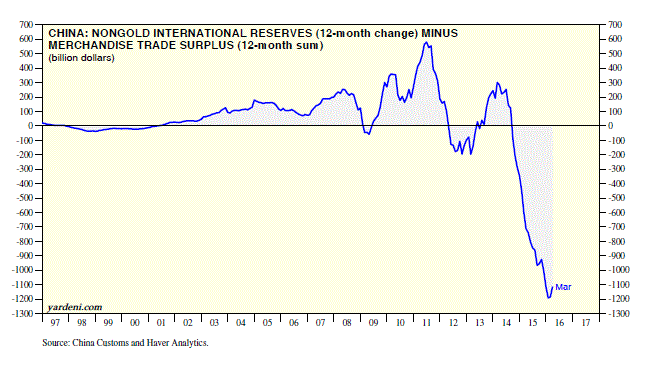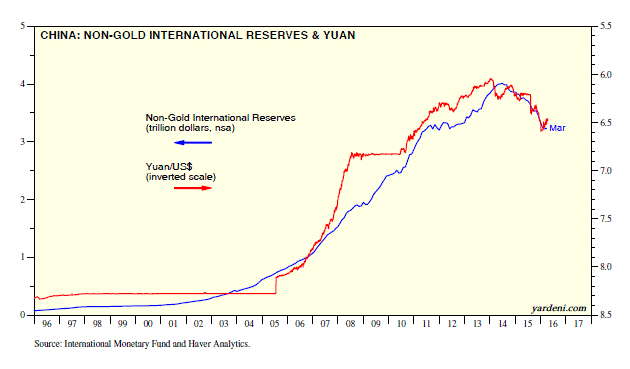I love conspiracy theories. They help to explain puzzling developments that don't make much sense unless there is a conspiracy behind them. The conspiracy theory du jour is that at the February 26-27 meeting of the G20 finance ministers in Shanghai, the Chinese threatened to devalue their currency by 15%-20% unless the Fed agreed to postpone normalizing monetary policy. A 4/8 Reuters article titled "Markets happy to play, if not believe, idea of G20 dollar accord," reviewed the possible scenario. It observed:
Even if there was no secret deal to weaken the dollar and stabilize world markets at a meeting of Group of 20 finance chiefs in Shanghai six weeks ago, currency and stock markets seem happy to play as if there was. ... In the weeks since, the three big headaches of the past year--China's yuan, falling oil prices and the threat of a stronger dollar and higher U.S. interest rates--have eased. In response, emerging markets have steadied, stocks and oil are not falling as fast and China's currency reserves, the cause of a huge global sell-off in early January, are rising again. It looks almost as if someone planned it.
The article proceeded to report why such a secret agreement was unlikely to have occurred: "China's vice finance minister last month also denied the existence of a secret agreement with Washington. 'The more conspiracy oriented sides of this are fairly unlikely,' former U.S. Treasury chief Larry Summers told an event in Washington this week. 'It is just not the way that they (central banks) work.'"
Maybe so, but in the 1/26-27 FOMC minutes, China's troubles were mentioned six times. In the 3/15-16 minutes released last Wednesday, China was still mentioned three times, though financial conditions over there had improved. On the other hand, Fed Chair Janet Yellen mentioned China only once in her 3/16 press conference. However, in her 3/29 speech before the Economic Club of New York, Yellen singled out China and the country’s currency as a major source of global uncertainty as follows:
One concern pertains to the pace of global growth, which is importantly influenced by developments in China. There is a consensus that China's economy will slow in the coming years as it transitions away from investment toward consumption and from exports toward domestic sources of growth. There is much uncertainty, however, about how smoothly this transition will proceed and about the policy framework in place to manage any financial disruptions that might accompany it. These uncertainties were heightened by market confusion earlier this year over China's exchange rate policy.
Interestingly, in a 4/5 speech on the global economic situation, IMF Chief Christine Lagarde mentioned China five times, noting that its economy was slowing. She also observed: "Following turbulence at the beginning of this year, economic sentiment has improved--driven by further easing from the ECB, an apparent shift to a slower pace of rate increases by the U.S. Fed, a relative firming of oil prices, and lower capital outflows from China." That certainly sounds like the G20 finance ministers' ideal outcome following their meeting. You decide whether it was a lucky coincidence or a conspiracy.
In any event, the downward pressure on the Chinese yuan started around mid-2014, about the same time as the dollar started to soar on mounting expectations that the Fed would soon start raising interest rates while the ECB and BOJ were going the other way. The situation might have been exacerbated by Chinese companies that had borrowed in dollars and were scrambling to get dollars to pay off those debts in order to borrow at home instead.
Gillian Tett, the widely respected FT reporter, hobnobbed in Davos in late January and recapped the intelligence she gathered in a 1/21 article titled “The tiny shifts that can signal huge changes.” She raised the possibility of lots of trouble among emerging markets that had borrowed in dollars:
In recent years emerging markets companies in general--and Chinese groups in particular--have dramatically increased their dollar debts. The Bank for International Settlements calculates this now stands at $4,000bn for emerging markets as a whole, four times higher than in 2008. A quarter of this debt has emanated from China. Until lately, using dollar-based markets to issue bonds or take loans seemed a smart strategy for Chinese groups. After all, the US Federal Reserve has kept dollar rates at rock bottom lows and the renminbi has strengthened against the dollar in the past decade. But now the US interest rate cycle has turned and the renminbi has weakened. Moreover, contrary to assurances made in Davos by China’s most senior regulator that Beijing is committed to maintaining a stable currency, most delegates I have spoken to expect the renminbi to fall 10-15 per cent against the dollar in the next year.
From the perspective of Chinese officials, the Shanghai conspiracy makes sense. They wanted the US dollar to stop soaring, and figured that would happen only if the Fed backed off hiking rates. Their off-the-record Davos chatter confirms that they were threatening to devalue their currency if the Fed persisted. Meanwhile, Fed officials finally seem to have realized that a soaring dollar is not good for the US economy. So the Shanghai “deal” (whether it was a coincidence or a conspiracy) made sense for both the US and China.
By the way, another coincidence is that the yuan stopped falling as Chinese capital outflows slowed. The yuan fell to this year's low on January 7, and is up slightly since then. China's non-gold international reserves edged up by $11 billion during March after dropping $788 billion from the record high of $4.0 trillion during June 2014. Over the 12 months through February, China's reserves fell $594 billion while the country's trade surplus totalled $591 billion, implying capital outflows of nearly $1.2 trillion. It's not obvious what caused the outflows to suddenly stop in March. Maybe it was a conspiracy.


